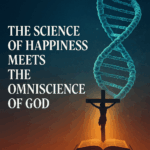“Perfectly Natural: Growing in Wisdom and Favour” – Luke 2:40-52
1. Jesus grew… AMAZING!
Our Gospel reading today is framed by two verses that are as amazing as anything you will ever read. The first verse of our text says: “And the child [Jesus] grew and became strong, filled with wisdom. And the favor of God was upon him.” And the concluding verse reads: “And Jesus increased in wisdom and in stature and in favor with God and man.”
Now this is amazing. Really. But you say: “What’s so amazing? The child Jesus grew and developed, physically, mentally, spiritually, and socially. It sounds perfectly natural.” But that’s just the point! It does sound natural. Jesus grows and develops like any child would. But this raises the question: How could Jesus, the one and only Son of God from eternity, be “Growing in Wisdom and Favor”? Didn’t he already have all that from the get-go? And then, to add to the mystery: Yes, in Jesus’ case, his growth and development is “Perfectly Natural.” It’s like any other child’s, except perfect, no sin to mar the picture. And so our text today goes to the mystery of the Incarnation: the person, identity, and saving work of Jesus Christ, and thus with it, your very life and salvation.
Our text begins by taking us from Jesus at forty days old all the way up to Jesus at twelve years old, all in a single verse: “And the child grew and became strong, filled with wisdom. And the favor of God was upon him.” And then our text concludes by taking us from age twelve all the way up to the beginning of Jesus’ public ministry at age thirty: “And Jesus increased in wisdom and in stature and in favor with God and man.” And in between we have the incident at the temple, which we’ll get to. But so much time and growth is covered in those two bracketing verses! From a baby to age twelve, and then from twelve to adulthood. That’s all we know of Jesus’ childhood and his adolescence and his young adulthood.
2. Jesus developed as a normal child – perfectly natural
So Jesus grew and became strong, he increased in stature. He increased in wisdom, he was filled with wisdom. God’s favor was upon him, he increased in favor with God and man. Now the physical growth we can wrap our mind around, I guess. He got bigger, taller. But even that is filled with mystery, if you think about it. The infinite, eternal God took on human flesh. This is the miracle of Christmas, the Incarnation. The Second Person of the Trinity, uncreated, without beginning and without end, at a certain time and place in history came into this world as a little baby, as our brother. Now try wrapping your mind around that! True God and true man, in one tiny, helpless infant – Jesus Christ.
And this child grew and developed physically, as a normal, natural child would. He learned how to walk. He learned language, in this case, several: Aramaic, the vernacular language of the land, as well as Hebrew, the language of the synagogue; Greek too, the international language of commerce and culture, and probably some Latin, the language of the Roman Empire. He hung around with his dad – his earthly father, I mean, Joseph, who was engaged in the building trades – and young Jesus probably learned how to swing a hammer and cut wood and create furniture. He grew academically/intellectually, for Jesus went to Hebrew school at the synagogue with all the other boys, where he studied the Scriptures and learned how to pray. He developed socially, in favour with others. If they gave out report cards at his school, His would probably say, “Plays well with others.”
This was one good kid: smart, capable, well-behaved, well-liked, religious, obedient to his parents, respectful to elders. If they were giving out Eagle Scout badges – well, what’s higher than an eagle? A golden eagle? Young Jesus would have merit badges up and down the sleeves of his tunic.
Think about it. Well, actually, it’s hard to think about, it’s hard to imagine. Jesus was everything a human child – or any human being, for that matter – should be. He was not held back or slowed down by the sin and foolishness we inflict upon ourselves. Think of how much smarter and brighter and more skillful you would be if you hadn’t done all those foolish things, if you had really applied yourself, if you hadn’t been disobedient or slothful or sneaky. Jesus was what “normal” should be for human beings created in the very image of God, if we sons of Adam and daughters of Eve had not listened to the little man with the pitchfork on our shoulder. How sin, our own sin, has marred our development! Not so with Jesus, who does the “human thing” just right, even as a child. Jesus is “perfectly natural” and at the same time “naturally perfect!”
3. Jesus grew… in wisdom
That, my friends, is wisdom. It says Jesus “increased in wisdom,” He grew and became strong in wisdom. What is wisdom, biblically speaking? It is not just knowledge, although it certainly includes that. A wise person will learn and know the Holy Scriptures, what they say. But wisdom, divine wisdom, is even more than that. Wisdom is applied knowledge, the divine teaching applied to life. It includes faith and good judgment and character, demonstrated in behavior. Wisdom is heavenly instruction applied to earthly life. It is how to walk, how to conduct oneself, toward God and toward others. It is right living, proceeding from a right attitude: a heart open to God, humble and receptive and teachable. Wisdom: Jesus had it, in spades. He lived it. He is it.
That Jesus could “increase” in wisdom – that again goes to the mystery of the unique person of Christ. 100% God, 100% human being, in one undivided person. The earthly child of Joseph and Mary. The Son of God, come in the flesh, sent on a mission by his heavenly Father. That Jesus realizes this, His self-identity and mission – this is evident in the incident at the temple at the age of twelve. And yes, it’s really the only peek that we have into the childhood and adolescence of Jesus.
4. Jesus – lost at Passover time!
It’s Passover time, religious holy days, and like good religious families do still today at Christmas or Thanksgiving or Easter, Joseph and Mary take their child to church. The church, the temple, is in Jerusalem. Passover is a pilgrimage festival, and that means trekking the long journey from Nazareth to Jerusalem and back, by foot. Often a bunch of families from the same area traveled in a caravan, friends and neighbors and relatives all traveling together on the long hike. Kids, as they are wont to do, might spend some time on the way with their cousins or their pals down the block, and the parents wouldn’t worry about it, because everybody would get sorted out at nightfall when they set up camp. Well, on the trip back to Nazareth, at the end of the day, Joseph and Mary look around, they check with all the other families in their group, and guess what? No Jesus.
Mom and Dad are panicky. If they had Amber Alerts back then, they would issue one. If they put pictures on milk cartons, Jesus would be the next one to appear. Joseph and Mary hightail it back to Jerusalem. They look up and down. And finally they find Jesus, in what for Him was the perfectly natural place for Him to be: In the temple.
5. Jesus grew – discussing theology
Hanging out with the seminary professors. Discussing theology. At age twelve. You see, Jesus is the Word of God incarnate. And he’s been growing in wisdom, unimpaired by sin. His understanding of the Scriptures is amazing, jaw-dropping, perfect! He’s not a show-off, a know-it-all, but He really DOES know it all. He knows it, and He knows how to apply it… remember, that’s wisdom! Above all, He knows who He is, and He, Jesus, is the key to understanding any and all of the Scriptures. Oh, and remember, for Jesus the Scriptures were just what we know as the Old Testament – the history, the prophets, the Psalms and Proverbs. But He knew that they all pointed to Him, because, after all, as one member of the Trinity God-head, He is the author of those Scriptures, the architect of the salvation plan, and the good and gracious and merciful God who dealt compassionately with His chosen people, Israel. So, it’s not really surprising to see Him discussing theology with those religious leaders in the temple. And Luke tells us that He both asked the teachers questions, and answered their questions. It makes you wonder who was grilling who. Was Jesus asking questions in order to learn from those teachers, or was he asking questions in order to probe and check their own theological understanding? Was Jesus answering their questions like a confirmation student responding to the assessment questions of the pastor, or was He answering their genuine questions because they realized that Jesus knew something that they didn’t, and they were seeking revelation? You see, Jesus had already grown in wisdom.
Jesus’ own sense of identity and mission become evident when Mom and Dad show up. They, naturally, have been at wit’s end worrying about their son, as any parents would be. “Son, why have you treated us so? Behold, your father and I have been searching for you in great distress.” Now it wasn’t as though Jesus had done this, staying behind and not telling them, in order to mistreat his parents. No, that was not it at all. But Jesus was aware of his unique identity and mission, and he wanted his earthly parents to realize it, too. This event would imprint that on their minds. Jesus has a higher calling in life than any other child, ever.
6. Jesus – “about my Father’s business” – saving YOU!
And so we hear His response, which is not disrespectful but rather realistic. Jesus tells them, “Why were you looking for me? Did you not know that I must be in my Father’s house?” And when Jesus says, “in my Father’s house” – or it could be translated, “about my Father’s business” or “about the things of my Father” – Jesus is not there talking about his earthly father, Joseph, and the carpentry business. No, he is talking about His heavenly Father, God Almighty, who had sent His only-begotten Son to this earth to do His will. The “Father’s house,” in that sense, is the temple, in Jerusalem, for that is the place of God’s presence with His people, where sacrifice is made, where sins are forgiven. And so it is to the temple, in Jerusalem, that Jesus’ saving mission must take Him, on His last trip there, at another Passover. For He, Christ, will make the perfect sacrifice at that time, there in Jerusalem, at the cross, as the Lamb of God who takes away the sin of the world. That’s what John the Baptist said as Jesus came to him for Baptism. That is why Jesus came – to take away the sin of the world. That is what the Scriptures – the Old Testament Scriptures – are all about. They point ahead to the One who has borne our griefs and carried our sorrows, the One who was wounded for our transgressions and crushed for our iniquities, the One with whose stripes we are healed. This is true wisdom, God’s saving wisdom, his divine plan put into action by his obedient Son, Jesus Christ. Jesus knows this, even at age twelve, and he wants Mary and Joseph to know it, too.
And he wants you to know it, you who need this Savior sent from God. Jesus must be about the things of his Father, and chief among those things is to suffer and die for you. You who have not lived life right, you who have been disobedient, sneaky, slothful and neglectful. You who have not raised your children as best you could, not teaching them the faith and taking them to church as well or as regularly as you should. You who have not learned the Scriptures as diligently as you should nor wisely applied them to life in your interpersonal conduct. That’s you. That’s me. That’s all of us sinners, traveling together in the same caravan.
But Jesus comes searching and looking for us, for it is we who have gotten lost and separated. Jesus finds us, and in that finding Jesus is about His Father’s business: Forgiving sins. Rescuing from death and the devil. Giving us wisdom for how to live our life like it really counts, which it does. So that we too will be growing in wisdom, making right decisions and using good judgment in how we live. Our Savior Jesus first makes us alive, giving us new life, and then he makes us more and more into “normal” human beings, living and loving the way people created in the image of God were meant to do.
Yes, dear friends: It’s perfectly natural for Jesus to do these things. Jesus must be about the things of his Father. It’s who He is, and it’s what He does. Perfectly. Natural. For us! Amen.








